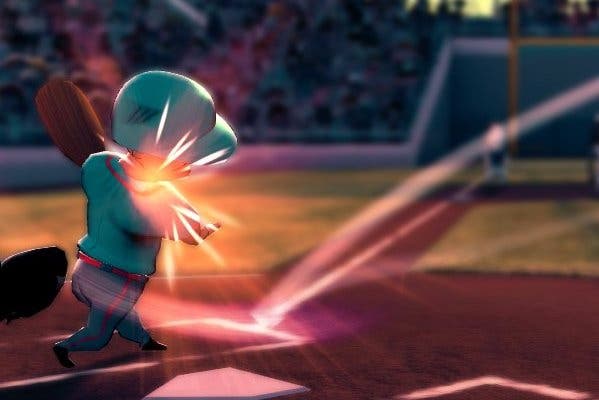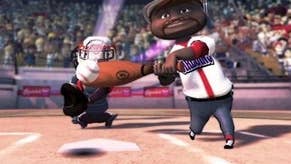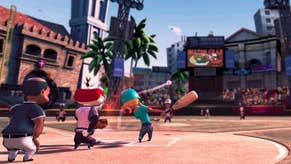Super Mega Baseball review
Go the distance.
When the Peanuts creator Charles M. Schulz wanted to show the sweet glory of a baseball pitch in flight, he would use a sort of shorthand. He'd draw two straight lines, scoring a horizontal channel across the panel, and within that channel a third wavy line gave you an impression of the stitching, moving up and down as the ball turned. If you enjoy spotting details like that, you'll love Super Mega Baseball, a game in which reading the stitching of an incoming ball is an entirely legitimate tactic. Is it spinning? If so, how fast? What kind of pitch am I dealing with? Where is it going to meet the bat?
At times, it has felt like I've been leading Charlie Brown's loser team, too. Super Mega Baseball looks arcadey, with its goofy, plastic-skinned players perfectly invoking the kind of bobble-head sports caricatures you can pick up in memorabilia stores, or wherever charcoal briquets and antifreeze are heavily discounted. Its unlicensed line-ups are filled with names like The Sirloins and The Moonstars. And yet there's a beautiful core of serious simulation at the very centre of it all. In short: everything you do matters here, and, true to Peanuts' form, the game is swift to punish mistakes. Whether you're pitching or batting or trotting to first base, you need to be paying attention. As with the best baseball games, the infield can feel very small and elbowy, while paradoxically, a ball can take an age to get to the back fence - a truly agonising length of time, just right for your enemies to position themselves beneath its racing shadow. Super Mega Baseball captures the tactical horrors of baseball really beautifully, but it does more than that. This is a powerfully coherent baseball game, as well as being a witty, speedy, and surprisingly deep one.
And remember: baseball is a delight, but it can be tough for video games to truly capture that. With its entirely distinct roles - batting, pitching, fielding - the sport seems eager to fragment into mini-games. Watching real baseball makes you feel you're witnessing a factory in flow - with the bases loaded and the singles churning through, the whole thing is a bit like a machine for making runs. Super Mega Baseball nails this: it invokes the particular romance of each part of the game, but they also always feel like they're part of something bigger.
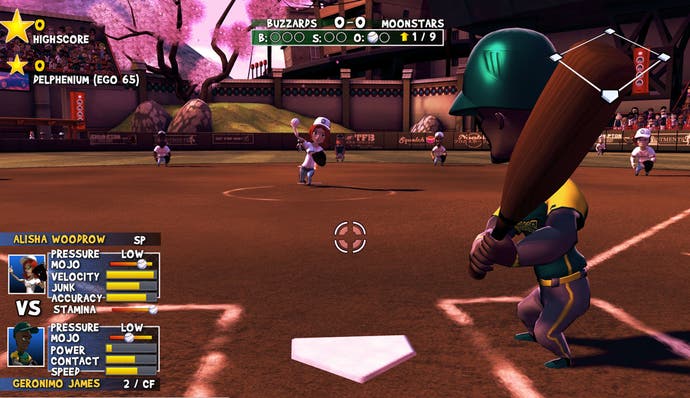
Pitching and batting use very similar systems, for example. In the former, you dial the particular pitch you're after using the right stick, and then you position the throw within a target box, and let it rip, which involves nursing a moving cursor into a highlighted sweetspot. If you miss the sweetspot, the ball won't land where you wanted it to. It's an organic process, and one that encourages you to engage with the Poker-y bluffing side of the game as you try to mislead your opponents or psych them out.
Batting retains the target box as well as the emphasis on reactions, as you move the cursor to adjust for an incoming ball and then swing. While you have real scope to decide where the ball is eventually going to land after you whack it, picking empty spots in outfield or even aiming to loft it over a fence, a huge part of your eventual success comes down to choosing which pitches to work with and which to ignore. There is room here to overthink things catastrophically, in other words, just as in real batting.
Crucially, both pitching and batting revolve around the same simple choice: press one button for a standard move, or hold and release another at just the right moment for a power shot. Power shots are where the glory is, but they're harder to pull off, and they're riskier, too, as you could be giving the batter ammo for a home run, or giving the fielders an easy catch out of a clear blue sky. Choices like this reveal that while Super Mega Baseball may have reduced the game to its essence, it's sacrificed nothing in terms of intricacy, thanks to the reliance on convincing physics and systems that really measure player inputs.
Fielding and running the bases are both equally straightforward. Fielding handles a fair amount of stuff automatically as it has to in a team sport - but still gives you a lovely chugging slow-down when the ball's infield to allow you to position someone for a catch - while long balls can be met with a hop or a dive if you're quick with the triggers. Throwing to a base uses the face buttons, which provides the wonderful flavour of a neat rhythm action title, while going for a double rather than a single when running sees you squeezing a trigger and hoping, as the game plays the scuttling equivalent of the Pac-Man ghost-munching music. It's perfect!
Super Mega Baseball is also a lovely reminder that as much as it's trying to deliver a great sporting sim, the sport in question is also a strategy game underneath it all. Baseball's a bit like XCOM, really, with the tactical battles of each individual game mounted in the wider strategic framework as you nurse a team through a season, making sure everyone's in their best position and keeping the training ticking over. It's just a shame you can't equip mechs. Throughout each game, you earn Starpoints for doing things like connecting well or getting a nice clean catch. These are used as a kind of XP system, with each additional level allowing you to buy extra staff, who come with a selection of upgrades for your players. Choosing who gets the right upgrade can be as important as working out who should be your starting pitcher or when to go for a substitute. Meanwhile, as the season goes on, watching the other teams chug through their simulations between your own games becomes as nerve-wracking as the bottom of the ninth when you're lagging behind.
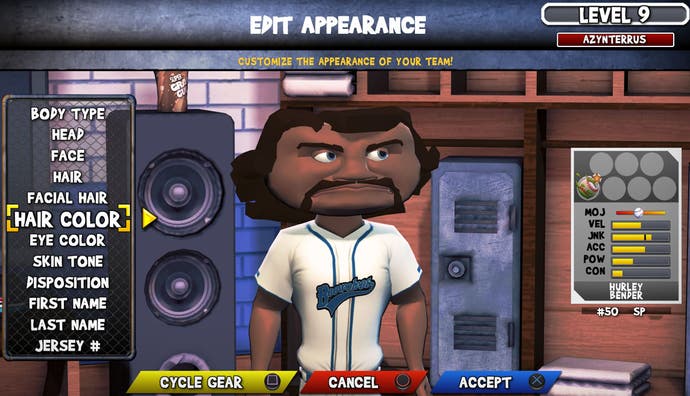
It helps throughout that the single-player stuff is bolstered by lovely, convincing AI, which encourages you to see each team you face not as a single unit, but as a selection of fallible, occasionally brilliant people that you can learn to truly hate. The strange humanity they exude, captured in the deft economy of animations that see them adjusting their caps or jumping on the spot before a pitch, makes sudden bursts of home run genius feel fair, rather than the iniquities cranked out by a cheating computer. Alongside the normal things like power and accuracy, each player has metrics for pressure and Mojo, too, and the latter is a fluctuating stat that tracks how they feel about what they've done so far in that game. Again, it allows flubs and screw-ups to feel more natural and emergent, and it encourages you to stop thinking of your opponents as being CPU-controlled automatons in funny pants.
Beyond that, there's four-player local-only multiplayer with - testify! - adjustable difficulty for each participant, and quick one-shot exhibition games as well as seasons. It covers the stuff you want, and gives you scope to layer in the detailing.
And we're back to the detailing. More than anything else, Super Mega Baseball captures the sounds and atmosphere and story-crafting potential of a game that is so reliant on sounds and atmosphere and the brutal craft of stories. There's the perfect dusty grind of the slide into a base, or the way a batter's body sags when he's missed the third strike. There's ample material for feuds or unlikely turnarounds.
And then there's that one special audio cue: pok! You know that sound. You know it! It's the rounded, punchy, friendly smack of a bat connecting with a ball that was already doing around 90. Close your eyes and you can see the aftermath: the heads tilted skyward, the arms dropping to the side. No need to chase after that one. Home run.
